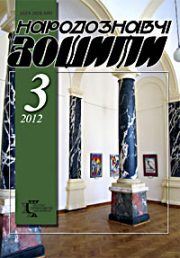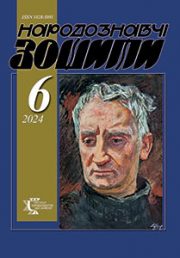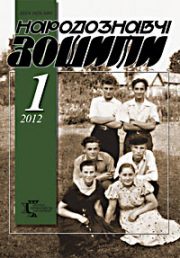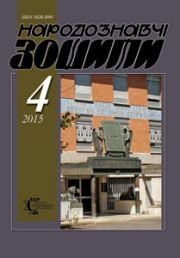The Ethnology Notebooks. 2021. # 1 (157), P. 3—18
УДК 398.21/.22:159.922.4](477.86)”194/196″(091)
DOI https://doi.org/10.15407/nz2021.01.003
Maria KACHMAR
- ORCID ID: https://orcid.org/0000-0002-7811-9576
- Candidate of Sciences in Philology,
- Research Fellow at the Institute of Ethnology
- of the National Academy of Sciences of Ukraine,
- 15, Svobody Avenue, 79000, Lviv, Ukraine,
- e-mail: mariakachmar@ukr.net
One of the important areas of interdisciplinary research today is the study of Ukrainian oral literature in its interaction with the national character. The article is devoted to the consideration of ethnopsychological features of folk tales and legends about the heroic struggle of Ukrainians in the 1940s and 1960s, in particular the motive of providing assistance as one of the basic in the plot of narratives. The urgency of the work lies in the comprehensive study of this motif, which will trace the longevity of folk tradition through its connection with the national character and identify innovative features of its semantics, due to the events of the mid-twentieth century. Such a critical view of one’s own historical past, reflected in folklore through the prism of collective consciousness and memory, will allow us to draw certain conclusions about the state of Ukrainian society during the «borderline» situation, the dominance of positive and negative mentalities in the context of relations between Ukrainian army (UPA) and the civilian population (peasants). The object and source base of the study are the texts of folk tales and legends about the national liberation struggle of Ukrainians during the Second World War, recorded in the Galician and Bogorodchany districts of Ivano-Frankivsk region in 2019 and put into scientific circulation for the first time. The purpose of the article is to trace the specifics of actualization in folk samples of one of the dominant features of national character — assistance, to identify its main types, to reveal the longevity of tradition and to clarify the role of the narrator in the process of accumulation, to point to other ethnomental factors that shape the bipolar perception of the need for such care. These include traits formed under the influence of Ukrainian individualism: altruism, humanity, «perceived sociality», escape to life in small groups, a certain egocentrism (Ukrainian — a typical owner). To fulfill the goals and objectives of the work used structural-typological, textual, historical-comparative, interdisciplinary methods, the method of field research. Theoretical and methodological basis are the works of Ukrainian folklorists (S. Myshanych, O. Britsyna, E. Luno, V. Sokil, O. Kuzmenko) and ethnopsychologists (V. Yaniv, Ya. Yarema, Yu. Lypa, D. Chyzhevskyi, S. Krymskyi, A. Furman and others).
Keywords: folklore narrative, national character, motive of assistance, insurgent heroic epic, individualism.
REFERENCES
- Kulchytskyi, O., & Khramova, V. (Ed.). (1992). Ukrainian worldview. In V. Khramova. Ukrainian soul (Pp. 48—65). Kyiv: Feniks [in Ukrainian].
- Yaniv, V. (1993). Ukrainian temperament and our educational ideal. Essays on the history of Ukrainian ethnopsychology (Pp. 196—217). Munich [in Ukrainian].
- Furman, A. (2001). Ukrainian mentality and its cultural and psychological coordinates. Psychology and society, 1, 9—73 [in Ukrainian].
- Yaniv, V. (1993). Social instincts of Ukrainians. Essays on the history of Ukrainian ethnopsychology (Pp. 158—174). Munich [in Ukrainian].
- Yarema, Ya. (1938). Ukrainian spirituality in its cultural and historical manifestations. The first Ukrainian Pedagogical Congress. 1935. (Pp. 16—88). Lviv [in Ukrainian].
- Demediuk, M. (2012). Ethnopsychological constants of Ukrainians in a fairy-tale narrative. Literature. Folklore. Problems of poetics (Issue 36, pp. 92—99). Kyiv [in Ukrainian].
- Luno, Ye. (2012). The cult of the native army in the insurgent epic tradition of Yavoriv region. The Ethnology notebooks, 5, 890—907 [in Ukrainian].
- Kuzmenko, O. (2008). Psychology of Ukrainian behavior in folk tales about the First World War (based on field materials from the archive of V. Hnatyuk). Studia methodologica (Issue 25, pp. 233—236). Ternopil [in Ukrainian].
- Sokil, V. (2017). Folklore prose about the Holodomor of the twentieth century in Ukraine: the paradigm of the text. Monograph. Lviv: Institute of Ethnology of the National Academy of Sciences of Ukraine [in Ukrainian].
- Britsyna, O. (2010). Twentieth century in the oral history of Ukrainians (notes on the historicism of folklore). In search of his own voice. Oral history as a theory, method and source. Collection of scientific articles (Pp. 135—144). Kharkiv: TORHSIN PLIuS [in Ukrainian].
- Liashchuk, N. (2016). Stereotype of national character of Ukrainians in prose genres of folklore. Linguistic and stylistic studies, 4, 123—130 [in Ukrainian].
- Myshanych, S. (2003). Near the sources of folk prose. Folkloristic and literary works (Vol. 1, pp. 297—350). Donetsk [in Ukrainian].
- Kuievda, V., & Kovtunovych, T. (2013). Psychological retrospectives of the Ukrainian ethnocultural model. Monograph. Kirovohrad [in Ukrainian].
- Bashhoz, I. (2010). Indentations in the oral narrative: a study on the author’s comments of Turkish narrators. Folklore and ethnography, 5, 94—102 [in Ukrainian].
- Dontsov, D. (1951). The spirit of our antiquity. Munich; Montreal [in Ukrainian].
- Lypa, Yu. (1953). Appointment of Ukraine. New York: Nakladom Ukrainskoi Knyharni «Hoverlia» [in Ukrainian].
- Tsymbalistyi, B., & Khramova, V. (Ed.). (1992). Family and soul of the people. In V. Khramova. Ukrainian soul (Pp. 66—96). Kyiv: Feniks [in Ukrainian].
- Krymskyi, S.B. (2008). Under the signature of Sophia. Kyiv: Vyd. dim «Kyievo-Mohylianska akademiia» [in Ukrainian].
- Kis, O. (2009). Women’s experience of participation in national liberation struggles in the western Ukrainian lands in 1940—1950. In East/West. Historical and cultural collection (Vol. 13—14, pp. 101—125). «Historical Memory and Totalitarianism: The Experience of Central and Eastern Europe». Kharkiv [in Ukrainian].
- Myshanych, S. (2003). From fact to artistic generalization (the skill of the narrator). Folkloristic and literary works (Vol. 1, pp. 87—108). Donetsk [in Ukrainian].
- Shchur, Yu. UPA and the Red Army: confrontation or interaction? Retrieved from: https://mil.in.ua/uk/blogs/upa-i-chervona-armiya-protyborstvo-chy-vzayemodiya/ [in Ukrainian].
- Vashchenko, H. (1976). Educational ideal: a textbook for educators, teachers and Ukrainian families. Brussels; Toronto; New York [in Ukrainian].
- Yaniv, V. (1993). Essays on the history of Ukrainian ethnopsychology. Essays on the history of Ukrainian ethnopsychology (Pp. 1—100). Munich [in Ukrainian].
- Antoniuk, Ya. (2008). Agency combat special groups of the NKVD — MVS — NKDB — NDB. In Scientific notes National University «Ostroh Academy». Historical sciences (Issue 10, pp. 213—225) [in Ukrainian].
- Potapenko, O.I. (Ed.) Dictionary of symbols. Retrieved from: http://ukrlife.org/main/evshan/symbol_d.htm [in Ukrainian].
- Kuzmenko, O. (2016). The First World War in the Ukrainian folk tradition. Ukraina Moderna, 23, 111—151 [in Ukrainian].
- Khramova, V. (Ed.). (1992). To the problem of the Ukrainian mentality. Instead of a preface. Ukrainian soul (Pp. 3—35). Kyiv: Feniks [in Ukrainian].
- Kozlovskyi, V.I., & Sokil, V. (Ed.). (2018). In V. Sokil. The Ukrainian folkloristic encyclopedia (Pp. 230—231). Lviv: Institute of Ethnology of the National Academy of Sciences of Ukraine [in Ukrainian].
- Chyzhevskyi, D. (1931). Essays on the history of philosophy in Ukraine. Prague: Ukrainskyi Hromadskyi Vydavnychyi Fond [in Ukrainian].
- Kostomarov, M. Two Rus nationalities. Leibzig: Ukrainska nakladnia [in Ukrainian].







